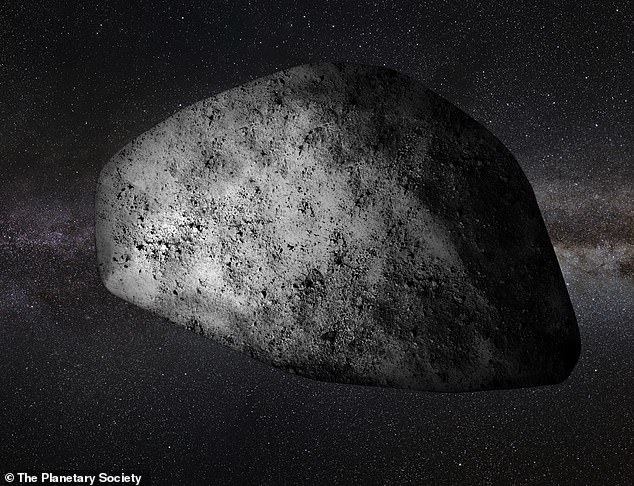The ‘God of Chaos’ Asteroid Could Cause Astroquakes When It Passes Earth on Friday the 13th
When the ‘God of Chaos’ asteroid flies past our planet in five years, Earth’s gravity could cause ‘astroquakes’ to occur, scientists have predicted.
Their research suggests that when the asteroid Apophis – named after the Egyptian God of Chaos – passes within just 30,000 kilometers of Earth, our planet’s gravity will cause it to shake violently.
The theoretical shaking could happen due to gravitational tidal forces, the stretching or pulling effect on an object caused by the uneven gravity of another massive body.
The team identified two physical processes that could occur. One would cause rocks and dust to fly off the surface, and the other would cause landslides that would occur gradually over tens of thousands of years.
Both would ultimately change the surface structure of the four-billion-year-old asteroid.
Scheduled for the flyby on April 13, 2029, Apophis is a “city killer” space rock the size of the Empire State Building.
If it were to hit Earth directly, its impact would be equivalent to detonating dozens or hundreds of nuclear bombs, according to The Planetary Society.
It wouldn’t destroy the entire Earth, but it could easily destroy a city and spread the destruction over a radius of hundreds of miles.
This illustration shows the size of Apophis in relation to New York City. A direct hit from this asteroid would not destroy the entire Earth, but it would wipe out a large urban area
Scientists have been closely monitoring this asteroid’s path since it was first discovered in 2004. Initially, the probability of a possible impact in 2029 was relatively high at 2.7 percent.
But more recent studies have shown the chance is closer to one in two billion.
A team of researchers led by Ronald-Louis Ballouz, an asteroid scientist at the Johns Hopkins University Applied Physics Laboratory, investigated what might happen to Apophis as it passes through Earth’s gravitational field.
Asteroids typically have weathered surfaces because they are constantly bombarded by meteoroids in a process called space weathering, Ballouz said. Living Sciencebut astronomers have long observed that space rocks that pass close to planets do not have weathered surfaces.
He suspected that the reason for this could be that the planet’s gravity is removing the outer layer of the asteroid’s surface.
To test this, the researchers created computational models of Apophis and then simulated each model’s path to Earth while tracking the physical changes, allowing our The planet’s gravity could be driving two different physical processes on Apophis.
The first are earthquake-like tremors that probably begin about an hour before the asteroid reaches its closest distance to Earth and continue for some time afterward.

When Apophis encounters Earth’s gravity, it could experience vibrations strong enough to lift boulders from the surface and release rocks into space, researchers say
It’s hard to say how intense this shaking will be. But Ballouz expects it will be strong enough to change Apophis’ appearance, lifting boulders from the surface and releasing some rocks into space.
The other process is a change in the asteroid’s tumbling. Space rocks like Apophis don’t spin on an axis like planets do. Instead, they tumble somewhat haphazardly through space.
Earth’s gravitational pull could change Apophis’ tumbling pattern, triggering landslides over tens of thousands of years that could further “refresh” the surface and reveal the layers beneath.
The research team’s findings are currently available in the arXiv preprint database and have been accepted for publication in the Planetary Science Journal.
If Ballouz’s hypothesis proves correct, it could explain why other asteroids exposed to the planet’s gravity show no signs of space weathering on their surfaces.
But he and his team won’t know for sure until NASA’s OSIRIS-APEX mission encounters Apophis during its 2029 flight.
This spacecraft will study the asteroid for 18 months to document any physical changes it may have undergone during its encounter with Earth.
As for whether Apophis could hit Earth directly soon, research has shown that we are safe for at least the next 100 years, according to the Planetary Society.
But to prepare for the unlikely event that another “city killer” asteroid could collide with Earth, NASA’s Planetary Defense Coordination Office is developing ways to deflect or destroy them before they impact.
